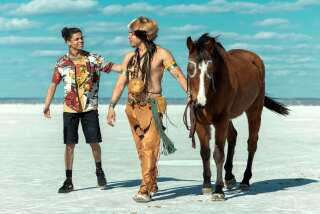Can fairy tales still come true?
- Share via
NEW YORK — Unbeknownst to many television viewers, the family miniseries “Dreamkeeper” slips onto ABC’s schedule Sunday and Monday nights. Other than a promotional ad in TV Guide and some on-air promos, there’s been little to herald this two-part, four-hour drama from veteran showman Robert Halmi Sr.
Contrast that with the marketing blitz that accompanied Halmi’s ABC miniseries “Dinotopia” in May 2002: a Macy’s Thanksgiving Day parade balloon, a companion exhibit at the Smithsonian Institution, licensed characters and a “making-of” program on ABC stations.
Then again, it’s odd to find an original program that cost the network $11 million airing in the week between Christmas and New Year’s, which is typically the dumping ground for reruns and prime-time news documentaries that a network feels an obligation to run but fears won’t attract viewers.
But the scheduling of “Dreamkeeper” doesn’t appear to be a reflection on its quality; indeed some ABC executives think it is Halmi’s best work since the 1996 “Gulliver’s Travels” on NBC.
Rather, the move is a sign of the changing fortunes of the genre, which is looking more and more quaint as televised fairy tale fantasy gives way to fairy tale “reality” weddings and gritty ripped-from-the-headlines movies of the week about such un-glamorous topics as kidnapping and war.
“Dreamkeeper” has no major stars and no particular promotional hook, other than an intergenerational plot that mimics that of the current feature film “Big Fish,” which also revisits long-told family stories through the eyes of a new generation. In “Dreamkeeper,” ancient American Indian stories from Lakota, Kiowa and Cheyenne tribes, among others, are brought to life as part of an emotional cross-country journey undertaken by a present-day grandfather (August Schellenberg) and grandson (Eddie Spears).
Although there are plenty of the computer-generated special effects that Halmi movies have become known for, the film also features a real-life herd of 1,500 stampeding buffalo, a cast of 95 and a powwow scene with 600 Native American extras.
Just a few years ago, such an extravagant film would have been designated for a high-profile “sweeps” period in November, February or May, and that was ABC’s initial intent. But last May, ABC’s schedule was in flux, Sunday’s “The Practice” having been moved to Monday; the network had already spent its marketing budget for the year; and the movie wasn’t quite ready. November wasn’t an option, because ABC has “Monday Night Football,” making two-part programs that launch on Sundays difficult. Next February, there isn’t a good weekend, what with the Academy Awards having been moved up.
At the same time, as unscripted fare such as “Trista and Ryan’s Wedding” has gripped some segments of the audience, fantasy miniseries -- including such Halmi productions as “The Snow Queen,” “Snow White: The Fairest of Them All” and “The 10th Kingdom,” all shown between 2000 and 2002 -- have virtually disappeared from network schedules. Fingers point to over-exposure and some major flops, the result of a rush to churn out a number of big projects too quickly. Another ABC project with Halmi, “Aztecs,” has been dropped, although the two are working on another miniseries inspired by an H.G. Wells story.
“Dreamkeeper” will be ABC’s only miniseries of the season, although Quinn Taylor, ABC’s senior vice president overseeing movies and miniseries, said, “I don’t think it speaks to a lack of faith in the genre.”
Although not all of ABC’s top executives have been supportive of the project, ABC insists it isn’t trying to bury “Dreamkeeper.” “This thing is too good to literally throw away,” said Taylor, who once called the script one of the best he had ever read and now says the finished product is better. “The idea was to protect it,” he said.
Taylor added that although “admittedly, it’s not the world’s easiest project to market,” he hopes families on holiday break “will be in the mood to watch something that is truly extraordinary and unique and all about family.”
“We honestly think it will do a better number here than against sweeps competition,” said Jeff Bader, ABC’s executive vice president in charge of scheduling. “It’s there to protect it, not bury it.” Acknowledging that the topic could be a hard sell, Bader said “Dreamkeeper” is getting more on-air promotion from the network than it would have gotten had it aired at a time when ABC was airing original series.
Halmi, 80, is his usual blunt self in assessing the situation. “This is what television should be, not bachelors marrying for millions of dollars,” he said. He said he is not unhappy about when the program is airing, however, but “I’m upset that good drama is not really backed up by marketing, and junk is.”
There’s one sector of the audience in which the build-up for “Dreamkeeper” has been substantial: among Native Americans. With more than 90 speaking parts for American Indians, it is “one of the best things to come to network television in a long time,” said Michael Smith, founder and president of the American Indian Film Institute, based in San Francisco.
At the Institute’s 28th annual American Indian Film Festival in November, the program took home four top honors: best film, best actor and best supporting actor and actress awards. Competition included “Coyote Waits,” the second installment of PBS’ new “Mystery” franchise based on Tony Hillerman’s novels, which feature contemporary Native Americans.
The ABC and PBS projects are anomalies, said White, noting that an NAACP-led push for on-air diversity in network television has only just begun to yield more opportunities. “Native Americans have such a very broad talent pool that is not being utilized by television and the film industry,” said White, a Sioux who is a member of the Ft. Peck tribe from Montana. “I hope people will say, ‘where have all these people been hiding and not being shown?’ ”
Praising “Dreamkeeper” for its blend of contemporary and historical themes, its recognition that tribes have unique languages and stories and situations and its fidelity to the legends, Smith said he hopes “Dreamkeeper” will stir up interest among the networks in contemporary films about Native Americans, just as “Dances With Wolves” generated more feature film work for its Native American stars. “This is a very high-profile event for all native people,” he said.
More to Read
The complete guide to home viewing
Get Screen Gab for everything about the TV shows and streaming movies everyone’s talking about.
You may occasionally receive promotional content from the Los Angeles Times.






